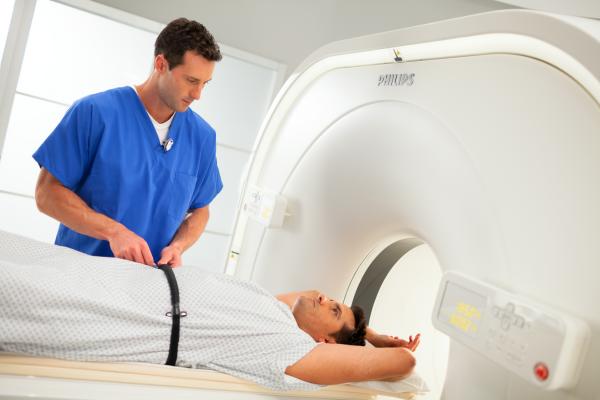
October 4, 2017 — Blue Earth Diagnostics recently announced the results of a pre-planned interim analysis from an investigational clinical trial evaluating the impact of fluciclovine (18F) PET/CT imaging on clinical management of men with biochemically recurrent prostate cancer eligible for salvage therapy.
The FALCON trial is a U.K.-based, prospective, multi-center, open-label study (NCT02578940) to evaluate the clinical impact of fluciclovine (18F) positron emission tomography/computed tomography (PET/CT) imaging on patient management decisions in men with biochemically recurrent prostate cancer. The primary endpoint of the FALCON study examines the percentage of men who have their management plan changed after a F-18 PET/CT scan. Blue Earth Diagnostics previously announced a halt to patient recruitment for the trial based on successful results of a pre-planned interim analysis.
Axumin (fluciclovine F-18 injection) is a U.S. Food and Drug Administration (FDA)-approved molecular imaging agent for use in PET imaging in men with suspected prostate cancer recurrence based on elevated blood levels of prostate specific antigen (PSA) following prior treatment. It is not currently approved in the United States for treatment planning in men with biochemically recurrent prostate cancer.
The FALCON trial recorded intended patient management plans prior to fluciclovine (18F) PET/CT and then recorded how they were altered once patients and their clinicians had results of the scan. Results of the interim analysis showed that 61.2 percent (52/85) of patients had their clinical management changed when results of fluciclovine (18F) PET/CT imaging were added to the standard-of-care diagnostic work-up. The interim results were presented in an oral presentation, “Impact of 18F-fluciclovine PET/CT on clinical management of patients with recurrent prostate cancer: results from the Phase III FALCON trial,” by Eugene Teoh, M.D., Oxford University Hospitals NHS Foundation Trust, at the 2017 American Society for Radiation Oncology (ASTRO) Annual Meeting, Sept. 24 – 27 in San Diego.
The FALCON trial enrolled men with a biochemical recurrence of prostate cancer being considered for curative intent salvage therapy. Intended management plans were recorded prior to fluciclovine (18F) PET/CT imaging and then compared with post-scan plans. The primary endpoint examined the percentage of men who had their management plan changed after a fluciclovine (18F) scan. A single, pre-planned analysis of the primary endpoint for efficacy or futility was performed based on the first 85 evaluable patients. Based on this analysis, recruitment in the trial was stopped for efficacy. Previously planned therapeutic management was revised after a fluciclovine (18F) PET/CT scan in 61.2 percent (52/85) of patients. Of the 52 patients with revised treatment plans, major revisions (e.g., salvage radiotherapy to hormone deprivation or watchful waiting) were made for 59.6 percent (31/52) of patients. Salvage treatment was revised to watchful waiting for 25 percent (13/52) of patients and to systemic therapy for 34.6 percent (18/52) of patients, while 40.4 percent (21/52) of patients had their previously planned radiotherapy field modified. The safety profile of fluciclovine (18F) in the FALCON trial is consistent with that described in the approved U.S. Prescribing Information.
“Biochemically recurrent prostate cancer poses an important medical challenge,” said Abhishek Solanki, M.D., assistant professor of radiation oncology, Loyola University School of Medicine, Chicago. “Currently approved anatomical imaging procedures have limitations in identifying the sites of recurrence of prostate cancer after definitive treatment, which can make decision-making difficult when assessing patients with biochemical recurrence. Newer imaging techniques, such as fluciclovine (18F) PET/CT, may provide actionable information for physicians in guiding appropriate patient management.”
“Selecting appropriate patient care options for men with biochemically recurrent prostate cancer is critical,” said Judd Moul, M.D., professor of surgery, urology, at Duke University. “Many options are available, and some patient management plans may carry uncertainty that could potentially be alleviated by more accurate information. Clinical studies are important to investigate the role that reliable information provided by diagnostic imaging can play in guiding appropriate management for men with recurrent prostate cancer.”
Blue Earth Diagnostics has also updated the status of its investigational LOCATE study (“The Impact of 18F Fluciclovine (FACBC) PET/CT (Positron Emission Computed Tomography) on Management of Patients with Rising PSA (Prostate-specific Antigen) After Initial Prostate Cancer Treatment”), which completed patient enrollment earlier than anticipated. Compilation of data from the 15 clinical sites is currently underway, with results planned for peer-reviewed presentation and publication next year. The LOCATE trial is a U.S. multi-center study investigating the impact on patient management of 18F fluciclovine PET/CT imaging in patients with rising PSA after initial prostate cancer treatment. The clinical utility of 18F fluciclovine PET/CT imaging will be assessed by the change from initial to revised treatment plan.
For more information: www.blueearthdiagnostics.com


 February 04, 2026
February 04, 2026 









